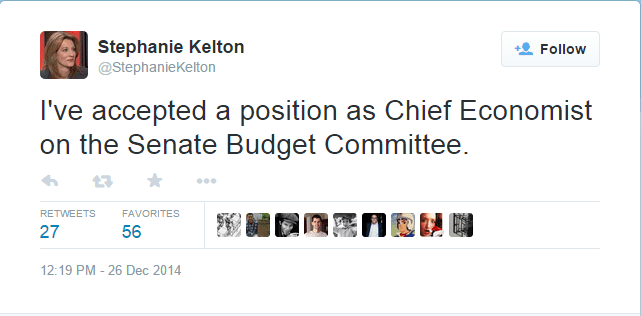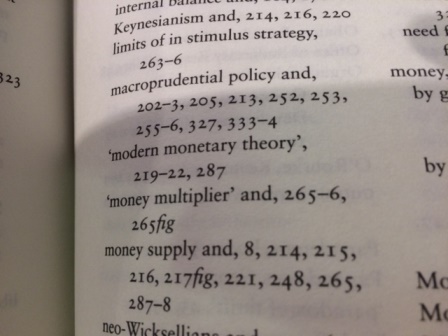Category Archives: MMT
Mosler RT interview part 2
Student video
“Seven deadly innocent frauds of economic policy” translation to spanish
Warren Mosler on RT video
These are excerpts from the interview.
They said they will be using the rest later.
Jim Rickards on currency wars and Mosler on Saudi oil price cuts
Wolf’s references
New School NYC event
Real Fiscal Responsibility Today Radio and TV Show pilots
The Real Fiscal Responsibility Talk Show Pilot Project
This project is for everyone tired of hearing economic commentary from those who got everything wrong. For decades the the doctrine of “Fiscal Responsibility” interpreted as long-term deficit reduction and Government austerity has had a secure place in American politics. The three of us proposing this project believe that this doctrine is the economic equivalent of the medieval notion that patients must be bled to cure them of disease.
The notion that austerity is necessary after running budget deficits caused by economic downturns is false and damaging to economies all over the world. We have opposed targeted deficit reduction and austerity in the blogosphere and in an e-book since 2010. Yet despite our efforts and the efforts of many others who using the Modern Money Theory (MMT) approach to economics, as well as other post-Keynesians, the mythology of austerity still survives, waiting in the wings until the next debt ceiling or budgetary crisis provides an opportunity for austerity partisans to push their nostrums of spending cuts and “Grand Bargains” once again.
We value Real Fiscal Responsibility highly, but that doesn’t lie in targeted deficit reduction, or in spending cuts for their own sake. Instead, it lies in targeting real impacts, real benefits, and real results, and fulfilling the needs of real people. We want to replace the false and damaging austerian accountant’s green eyeshade paradigm of so-called Fiscal Responsibility, evaluated against the arbitrary standards and scare tactics of debt-to-GDP ratios and public debt levels, with the human scale paradigm of Real Fiscal Responsibility, evaluated against the standard of fulfilling public purpose.
We seek funding for a pilot project for a new radio/video series that will present, and advocate for this paradigm change. The project will create six shows that we will then use to get the series picked up by an existing cable network.
Please visit the donation page.
Last tweet of Aaron Swartz before he died
Time to say goodbye? Schauble Calls on Italy to Pursue Structural Reform
Schäuble Calls on Italy to Pursue Structural Reform
By Andrea Thomas
July 16 (WSJ) — German Finance Minister Wolfgang Schäuble called on Italy to pursue its ambitious structural reform efforts if it wants to boost its economic-growth prospects. “Especially since growth forecasts for Italy have been reduced recently, it’s important to reform and cut the debt level convincingly,” he said. Italian Prime Minister Matteo Renzi has presented ambitious and broad-based reforms, he added. “The Stability and Growth Pact is the foundation for politico-economic cohesion in Europe,” said Mr. Schäuble. “The Stability and Growth Pact provides sufficient flexibility. It’s doesn’t stand in the way of structural reforms; quite the opposite, it promotes them.”
This is a direct response to Prime Minister Renzi who asked for what can be described as a minuscule amount flexibility with the deficit rules. (Note that Schauble didn’t even say said reforms would boost growth, only ‘growth prospects’, whatever that means.)
The problem is that for any given level of govt spending (a political decision) tax liabilities are too high to allow ‘savings desires’ to be accommodated. And ‘the debt level’ is best thought of as the ‘money supply’ (deposits at the CB) that’s the euro ‘savings’/net financial assets of the non govt sectors.
Said another way, the currency itself is the EU’s public monopoly, and the mass unemployment is necessarily the evidence that the monopolist is restricting the ‘supply’ of net financial assets demanded by the economy.
Said another way, for all practical purposes said reforms don’t increase aggregate demand. At best they address what I call distributional issues.
My proposal is for Italy to deliver an ultimatum to the EU giving them 30 days to relax the 3% deficit limit and eliminate the 60% debt/GDP limit.
If the EU refuses, Italy has two choices:
1. Do nothing as the destruction of their civilization continues,
2. Begin taxing and spending in ‘new lira’ with fiscal policy that promotes output and employment.
And note that if they do go to ‘new lira’ and retain their now constitutionally mandated balanced budget requirement, it will all get even worse.






